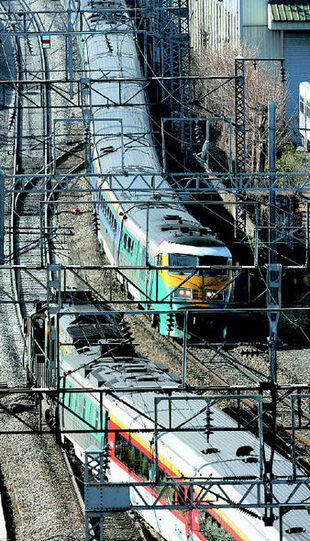hankyoreh
Links to other country sites 다른 나라 사이트 링크
[Analysis] Bumpy ride expected leading up test of joint Korean train lines

At a meeting of a related committee on April 18-22, the two Koreas agreed to test-run the Gyeongui and Donghae railway lines connecting the divided countries.
However, observers do not anticipate things to go smoothly leading up to the test date, as the test run scheduled for May 25 last year was cancelled a day prior because Pyongyang said the North Korean military would not guarantee the safety of the train. The test-run was then further delayed due to deteriorating inter-Korean relations following the North’s missile tests in July and nuclear test in October.
The Gyeongui railway cuts across the western part of the demarcation line between the two Koreas and the Donghae line runs along the East Sea. The trains would pass through the heavily fortified zone separating the two Koreas, so it is thus necessary for both militaries to guarantee the safety of the trains’ passage. But the North Korean military reportedly worries that the railway could be a passage for a South-U.S. attack, and other reports say the North’s military is also concerned that the railway cooperation project could move the inter-Korean relationship forward such that the North’s conservative military cannot control matters between the two nations any longer. Thus, these reports say, it has not given its agreement to Pyongyang to help.
At the 13th meeting of the South-North Economic Cooperation Promotion Committee, officials from both sides decided the test run would be carried out on May 17.
Whether or not this test run is completed will affect the status of inter-Korean relations. On MBC radio on April 23, Unification Ministry Lee Jae-joung said, "If the railway test run again fails, basic inter-Korea relations will worsen." Indeed, if Pyongyang does not implement all matters relating to its side of the agreement, inter-Korean relations will suffer a strong blow, observers close to the matter say.
Related to this, a ministry official said on condition of anonymity, "This time, the military safety guarantee won’t be an obstacle to the test run of the railway lines." But while reporting about the railway test run on April 22, North Korea’s Central News Agency did not mention any agreement reached by the two Koreas regarding the military safety guarantee for the trains.
According to some observers, there also is a problem in connection with other safety issues in the test run. One expert stressed the necessity of conducting safety checks on the railroad tracks themselves at least three weeks in advance of the trial run. The agreement on the trail runs, however, only states that North Korea will "take responsibility" for the safety checks for railroad lines in the North. Some observers call it doubtful whether the North has an understanding of these advanced safety checks, refering to the fact that North Korea initially had proposed to conduct the trial run on May 9.
The committee meeting touched on another problem in relations between Seoul and Pyongyang. The South Korean government supports the shipment of about 400,000 to 500,000 tons of rice to North Korea every year, but the program has been halted since North Korea’s missile test last July. At the meeting, the South agreed to provide the North this year with a total of 400,000 tons of rice, worth nearly 140 billion won. But the South’s food and fertilizer aid to the North is just a short-term solution for the purpose of emergency relief; further agricultural cooperation between the two countries is urgently needed. Such cooperation, agreed upon in earnest at ministerial-level talks in 2005, was not mentioned at all during the April 18-22 committee meeting.
The first - and last - joint Korean agricultural cooperation committee meeting was held at the North’s Gaeseong (Kaesong) between August 18-19, 2005.
Please direct questions or comments to [englishhani@hani.co.kr]
Editorial・opinion
![[Column] Has Korea, too, crossed the Rubicon on China? [Column] Has Korea, too, crossed the Rubicon on China?](https://flexible.img.hani.co.kr/flexible/normal/500/300/imgdb/original/2024/0419/9317135153409185.jpg) [Column] Has Korea, too, crossed the Rubicon on China?
[Column] Has Korea, too, crossed the Rubicon on China?![[Correspondent’s column] In Japan’s alliance with US, echoes of its past alliances with UK [Correspondent’s column] In Japan’s alliance with US, echoes of its past alliances with UK](https://flexible.img.hani.co.kr/flexible/normal/500/300/imgdb/original/2024/0419/2317135166563519.jpg) [Correspondent’s column] In Japan’s alliance with US, echoes of its past alliances with UK
[Correspondent’s column] In Japan’s alliance with US, echoes of its past alliances with UK- [Editorial] Does Yoon think the Korean public is wrong?
- [Editorial] As it bolsters its alliance with US, Japan must be accountable for past
- [Guest essay] Amending the Constitution is Yoon’s key to leaving office in public’s good graces
- [Editorial] 10 years on, lessons of Sewol tragedy must never be forgotten
- [Column] A death blow to Korea’s prosecutor politics
- [Correspondent’s column] The US and the end of Japanese pacifism
- [Guest essay] How Korea turned its trainee doctors into monsters
- [Guest essay] As someone who helped forge Seoul-Moscow ties, their status today troubles me
Most viewed articles
- 1[Column] The clock is ticking for Korea’s first lady
- 2After 2 months of delayed, denied medical care, Koreans worry worst may be yet to come
- 3Hong Se-hwa, voice for tolerance whose memoir of exile touched a chord, dies at 76
- 4[Column] Has Korea, too, crossed the Rubicon on China?
- 5[Correspondent’s column] In Japan’s alliance with US, echoes of its past alliances with UK
- 6Samsung barricades office as unionized workers strike for better conditions
- 7All eyes on Xiaomi after it pulls off EV that Apple couldn’t
- 8[Editorial] As it bolsters its alliance with US, Japan must be accountable for past
- 9[News analysis] After elections, prosecutorial reform will likely make legislative agenda
- 10US overtakes China as Korea’s top export market, prompting trade sanction jitters